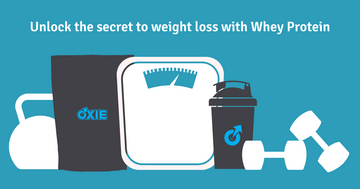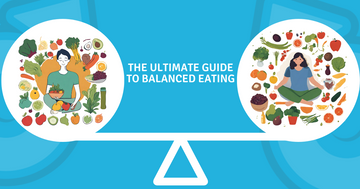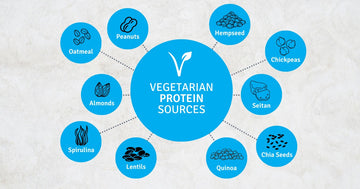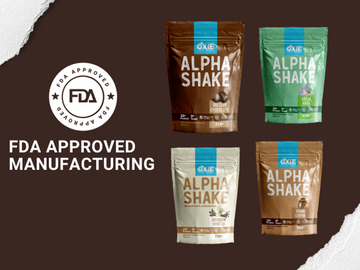What Are Maintenance Calories?
So in our recent blog, we covered the what are calories and every calorie is a calorie aspect of your health and lifestyle journey. Albeit it covered what exactly are calories, there is still a way to go on as to how being calorie conscious will help you control your diet and become a better version of yourself. According to us, weight management is a simple idea of your calories intake versus the calories burnt.
Your body responds differently to different calorie types and the process of converting calories into energy varies, based on the food you consume. At the end of it, not all calories are equal, and knowing the source of calories can take you a long way to maintain optimal health. Different food types will offer different levels of energy. The three macro nutrients - carbohydrates, protein, and fat do not provide the same calorie supply. Here is the break-up:
- 1 gram of carbohydrate will have four calories
- 1 gram of protein will also have four calories
- 1 gram of fat will have nine calories

Protein, comparatively to other nutrients will take more time to metabolize, which means your body will burn more calories from it. As mentioned earlier in our earlier blog, any calories that you cannot burn will get stored in your body as fat and hence its best to consume only the number of calories that you can burn.
That being said, the first step is to find out how many calories your body needs on an average basis to effectively burn to have a healthier lifestyle. If you never determine the optimal calorie count as we like to say it, you can quickly go off the track by consuming fewer or more calories than you need. So the concept is of maintenance calories, which will help you to less likely go off track with regards to the calories you consume. So, whether you are concerned about losing weight, gaining weight, or maintaining your weight, understanding maintenance calories can help you achieve your target. Your body needs the energy to do everyday muscle movement, cell growth, and other activities. If every calorie you consume goes towards this energy and not fat, we reach the point that is maintenance calories or TDEE (total daily energy expenditure). The process is excellent for people that are happy with their current state of energy and weight.
Deficit calories, which as the name suggests means consuming fewer calories than what you intend to burn. This leads to a calorie deficit that should help you to lose weight. However, some nutrition experts disagree that it is the best way to get healthy and sustainable weight loss. Focus on intuitive or mindful eating to achieve a practical weight loss goal.
Surplus calories is the concept of consuming more calories than you burn. It means that there is an energy surplus, which often leads to increased muscle fat or body fat. If you consume 2500 calories every day and burn only 2000 daily, the remaining 500 is surplus and stored in your body as fat or muscle depending on your lifestyle. It is perfect for people who want to gain weight.
But, in any of the above three scenarios, you should have a well-rounded diet of protein, vitamins, fiber, and minerals and avoid junk food. For overall weight maintenance, the quality of calories that you eat matters the most. Calorie count alone won't help, you should know your calorie intake to maintain or increase the deficit calorie count. For example, having healthy and clean food will give you essential vitamins, minerals, and nutrition in a healthy way. At the same time, sugary beverages like packaged fruit juices, tea, coffee, and soda may have the same calories but leave you feeling hungry sooner.
There is no doubt that you need to create a calorie deficit if you want to lose weight. You can do this by taking fewer calories than you burn. However, do not forget that not all calories lead to obesity. For instance, calories from protein help build muscles, which helps you stay active and burn more calories. At the same time, calories from fiber-rich food will keep you satisfied for longer and helps to lose weight. However, extra calories will eventually turn into fat, even from fat-free or low-fat diets. So, be cautious about making food choices and if it has good calories or bad ones.
To calculate your maintenance calories, multiply your BMR (Basal Metabolic Rate) with your daily activity factor. The first step here is to know your BMR and your activity level per day.
To calculate BMR, multiply your weight in pounds by 10 for women 11 for men as a multiplier. To calculate your physical activity, you should first find your multiplier. Locate the category that you fall in:
- Sedentary lifestyle: 1.3 for women and men
- Light activity: 1.5 for women and 1.6 for men
- Moderate exercise: 1.6 for women and 1.7 for men
- Active lifestyle: 1.9 for women and 2.1 for men
- Very active lifestyle: 2.2 for women and 2.4 for men
To calculate your maintenance calories, you should take your multiplier and apply it to your BMR. The figure will tell you how many calories your body needs to sustain your maintenance calories.
You can check out the short version on our Instagram profile.
Be an athlete, choose Oxie !






